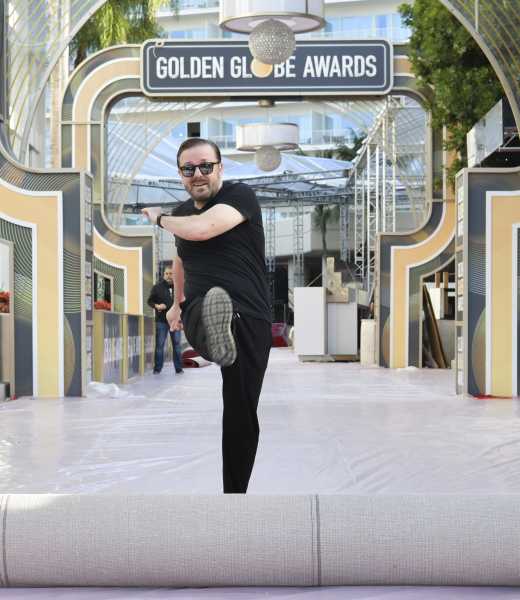
In 2018, then-four-time host Ricky Gervais said that hosting the Golden Globes again would be “the end of his career.”
Gervais was thinking of the blowback he would likely receive from the gig in an increasingly polarized culture as a provocative comic who’s known for offending people. But on January 5, he will indeed return to host the awards for a record fifth time.
NBC, which hosts the annual awards show, is leaning into the idea that Gervais’s hosting gig will be outlandish and unpredictable. There’s some justice to that: As Baffler’s Brendan James put it in a rundown of Gervais’s career, “Gervais’s only real claim on the public’s attention in the past ten years has been his epic, renegade, no-holds-barred Golden Globes roast-a-thon,” in which he’s known for taking potshots at other celebrities and their failings, from Mel Gibson’s alcoholism to Robert Downey Jr’s drug abuse.
In a recent interview with the Hollywood Reporter, Gervais described his hosting style as wanting to represent the perspective of the viewer watching at home who wasn’t invited into the room where it happens. But that descriptor downplays his habit of saying outrageous things both onstage and off. A look at Gervais’s standup history reveals that, far from being unpredictable, his comedy covers a pretty standard range of offenses, including taking cheap shots, doubling down on them, and getting defensive after the fact about people not getting the joke.
Gervais himself insists that punching down is a no-go: “You mustn’t make [identity factors] the target to be ridiculed,” he told THR. “You shouldn’t laugh at something they can’t help. … Deep down, I want people to know I’m not a racist or a homophobe or a sexist.” But in the same interview, he also rails against political correctness: “People like the idea of freedom of speech until they hear something they don’t like.”
This ambivalence means his Golden Globes gig will likely be a big swing from last year’s ground-breaking ceremony toward a more reactionary flavor. And while he may be on his best behavior for Sunday night’s ceremony, it’s also likely we can expect Gervais to joke about everything from war with Iran to cancel culture itself.
Related
Why we can’t stop fighting about cancel culture
How can we be so sure? Here’s a selection of highlights from his previous comedy and performances, as well as other moments from his past history.
He made a transphobic joke about Caitlyn Jenner, then couldn’t stop bringing it up and doubling down on it
At the 2016 Golden Globes ceremony, Gervais’s opening monologue included a joke about Caitlyn Jenner that many viewers read as transphobic. After referring to her by her pre-transition name — i.e. deadnaming her, a major “don’t” if you’re trying to support the transgender communities — Gervais joked that while she’d become a role model to trans women everywhere, “she didn’t do a lot for women drivers.” The joke was a reminder that, in 2015, Jenner had been involved in a tragic four-car collision that left one person dead; Jenner bore no responsibility for the accident and was not charged and it’s likely audiences barely remembered the incident or understood Gervais’s point.
So Gervais went out of his way to reiterate his point multiple times — first on Twitter, and then in his 2018 Netflix special, Humanity, where he made Jenner jokes that were far more explicitly transphobic than the joke he was trying to debunk as transphobic.
These additional jokes come in the middle of a segment in which Gervais describes creating a string of offensive jokes for his Golden Globes hosting gig — including jokes about Bill Cosby raping various celebrities — then ironically adds, “I’d never tell a joke like that, I’d never even think of that … You’re getting offended at a joke that doesn’t exist.”
Then he moved on to the Jenner joke. “It wasn’t transphobic in the slightest. It was a joke about a trans person, but the joke had nothing to do with that aspect of her existence.” To make the argument, he then repeats the Golden Globes joke verbatim and attempts to explain it.
“The target of the joke is a celebrity killing someone in their car,” he says. “A celebrity killing someone in their car, running home, and popping on a dress,” he says.
He then goes on to discuss the deadnaming, in an extended segment in which he protests that he can’t “acknowledge that she used to be a man — but she did! I saw him on the Olympic games!” He then doubles down on the deadnaming and misgendering, doing both repeatedly. It’s a deeply transphobic sketch in which he frames transgender identity as gaslighting him, while building a whole joke around Jenner’s anatomy.
He follows it all up by mocking the entire idea of transitioning by joking that he’s going to transition into a chimpanzee.
This is just the most well-known example of Gervais’s transphobic humor. But as Lindy West noted in the New York Times after Humanity’s release, his entire attitude toward trans identity is one of discomfort, and he “present[s his] spasms of discomfort as something relatable.”
Gervais recently drew backlash again for perceived transphobia just a few weeks ago. Shortly after the backlash over a transphobic tweet by J.K. Rowling, Gervais tweeted several things that many readers took as sardonic TERFdom.
He later clarified to THR that he’d been playing along with a spoof Twitter account intended to parody white progressives, and had been intending to “take the piss out of” the parody account — without acknowledging that he has a history of “taking the piss out of” trans identity itself.
Gervais has played with disabled identity in the past, not always positively
Gervais’s history of mocking disabled identities is long. During his 2007 Fame standup tour, in particular, the comic courted controversy with this brand of humor. First came a segment in which he jokes about taking an autistic child to a casino — the joke being that he ignorantly thought all autistic kids were like Dustin Hoffman’s character in Rain Man. Then came a bit when he joked about chronic fatigue syndrome, known as ME: “Not MS,” he clarified, “not the crippling, wasting disease. No, the thing that makes you say, ‘I don’t wanna go to work today.’”
He also stepped on toes with his portrayal of autism with his puzzling 2013 short series Derek, in which he revived a character he’d created in 2001, Derek Noakes. Noakes — who was originally a victim of child sexual abuse — reads to many people as an adult man with autism, despite Gervais’s insistence that the character is actually just naive and gullible. It’s worth noting that Gervais has also participated in fundraising events for autism support, and that he intended the character to be heroic, rather than a mockery; but many people had a muddled impression of the character, while the show itself drew mixed reviews.
He has mocked victims of sexual assault
Thankfully, his jokes here are rare, but they’re pretty dark. In the aforementioned Humanity special on Netflix, Gervais — in the segment where he coyly discusses jokes that were too offensive for him to stay onstage by … saying them onstage — he briefly mocks Bill Cosby’s victims by hypothesizing about which celebrities might be, essentially, unrape-able. First, he drops a slightly baffling joke implying that Helen Mirren is too much of a lady to be sexually assaulted. Then, he makes a fatphobic comment about Melissa McCarthy being too much of “a beast” to be subdued by the date rape drugs Cosby used in his assaults.
A third, extremely dark joke, is considered by some audiences to be one of Gervais’s best and by others to be among his most offensive for its “trivialization of male sexual violence against women.” The entire bit is built around a setup for a joke about child molestation, with an even darker “twist” joke about child sexual abuse at its center.
He defended Louis C.K.’s inflammatory post-Me-Too comedy
In late 2018, a Louis C.K. post-Me-Too comedy routine, which was still being workshopped through live performances, was leaked online, revealing a stretch of offensive material that mocked everyone from non-binary people to Parkland shooting victims.
Gervais spoke out in defense of Louis C.K., telling Vanity Fair in a 2019 interview that he sympathized with the other comedian for having jokes leaked while they were still in progress. But then he went further, once again blaming audiences for allegedly not understanding the jokes:
In other words, Gervais, joining many of his fellow comedians, blames cancel culture for destroying nuance in standup comedy, while also downplaying the reasons people find certain kinds of comedy offensive.
Oh, yeah, and he was part of that old resurfaced n-word bit
Remember that old segment from HBO’s 2011’s Talking Funny special that resurfaced in 2018 in which a bunch of male comics laugh at their own use of the n-word? In case you’ve forgotten which comics were involved in that delightful episode, here we have Chris Rock, a gleeful Louis C.K., a Ricky Gervais who seems hesitant at first but rapidly gets into the bit, and a Jerry Seinfeld who seems appalled the whole time.
This is important context for his assertion in the aforementioned THR interview that offensive humor is in the eye of the beholder:
In the clip above, it almost appears that Gervais is re-drawing the line in front of our eyes, deciding that a line that couldn’t be crossed seconds earlier — saying the n-word — is, in fact, fine.
So where does all this leave us? Probably right back where we started.
What does all of this mean for Gervais’s 2020 Golden Globes appearance? Probably just where we were four years ago, the last time Gervais hosted the Globes: with Gervais taking potshots at various celebrities and pet progressive issues, then retreating into a defensive stance on social media. Brendan James notes in his Baffler piece that this disappointingly banal pattern has pretty much defined Gervais’s most recent career phase:
This repetitive cycle means it’s probably too much to ask that Gervais undergo an attitudinal transformation before the Golden Globes ceremony and recognize that his transphobic jokes and other offensive jokes make life harder for real marginalized people.
But maybe this Sunday, with any luck, Gervais will just stick to mocking celebrities.
Sourse: vox.com






